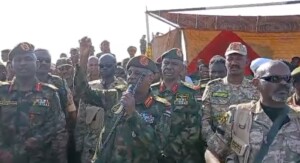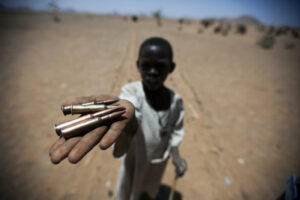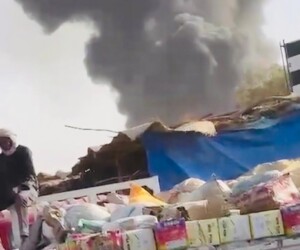Situation ‘worse than dire’ for West Kordofan displaced
The influx of people fleeing violence in the West Kordofan areas of Lagawa and Tema to the newly established camp for the displaced near Delling in northern South Kordofan continues while the humanitarian conditions in the camp are described as “worse than dire”.
 Displaced children receive lessons in a makeshift classroom in Delling, November 7 (Photo: Abdelrahim Kunda)
Displaced children receive lessons in a makeshift classroom in Delling, November 7 (Photo: Abdelrahim Kunda)
The influx of people fleeing violence in the West Kordofan areas of Lagawa and Tema to the newly established camp for the displaced near Delling in northern South Kordofan continues while the humanitarian conditions in the camp are described as “worse than dire”.
Intisar Khamees, who arrived at the camp a few weeks ago, told Radio Dabanga that there is “a shortage of everything”. She said that they are in need of food and blankets, in addition to latrines. “The space allotted to the camp is also extremely limited, in particular as new displaced continue to arrive.”
Khamees laments that while school children get lessons in the camp, “they are sitting on stones, while most of the teachers who fled together with them don’t have textbooks and seats”.
Hostilities began after a dispute over land rights at Gangaro village, about three kilometres east of Lagawa town. On October 13, Misseriya tribesmen claimed the land, which led to an exchange of gunfire between Misseriya and Nuba in the market in Lagawa itself, which continued through October 14 and 15. On 18 October, Lagawa was shelled by heavy artillery.
Incidents of tribal fighting in West Kordofan increased earlier in the year. Early June, Radio Dabanga reported about fierce fighting in Lagawa which left nine people dead. End May, at least six people were killed in the the violence that broke out between two Hamar clans.
Blue Nile
A man was killed in Medina 7 in Wad El Mahi, Blue Nile, on Thursday. Mohamed Mousa, head of the Blue Nile Hausa Sons Mechanism, told Radio Dabanga that the victim was attacked on the bank of the Blue Nile. A group of men hit him on the head with a cleaver, and then shot him in the stomach. The man died instantly.
Mousa described the security situation in Wad El Mahi as unstable due to repeated security breaches.
Displaced people who fled the violence in Wad El Mahi in the past few months, are still sheltering in Ed Damazin, capital of Blue Nile reported that they started enrolling their children in schools, however a number of parents complained to Radio Dabanga that their children were unable to enrol in schools due to the lack of (compulsory) school uniforms.
They explained that the responsible authorities distributed limited quantities of school uniforms, shoes and school bags.
The intercommunal violence that erupted in mid-July between Hausa and El Funj, supported by Berta, El Hamaj, and other ethnic groups in the northern part of Blue Nile state, which left at least 105 people dead and caused thousands to flee to the state’s capital Ed Damazin and safe parts of El Roseires, has flared up before. In September, at least 24 people were killed as the violence resurfaced. At 149 people died before October 6, according to OCHA.











 and then
and then